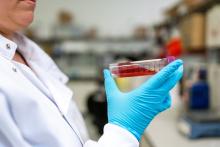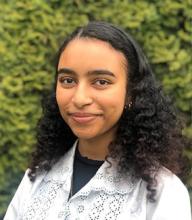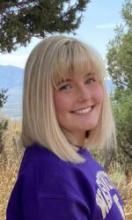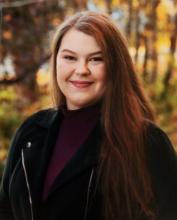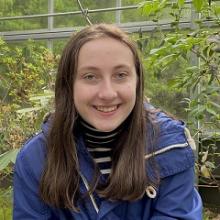The Levinson Emerging Scholars Program supports talented and highly motivated UW juniors and seniors who want to pursue creative and advanced bioscience and related research. Each year, ten outstanding UW undergraduates are named Levinson Emerging Scholars and receive funding to support their original research for 2-3 quarters, including funding to present their findings at a professional conference. Five of the ten Levinson Emerging Scholars for 2022-23 are biochemistry students: Sumaya Addish, Phoenix Davis, Morgan McCartney, Daniel Ong, and Sarah Stucky.
Sumaya Addish is a senior majoring in biochemistry. During the summer of her first year, Sumaya began research in the group of Professor Hannele Ruohola-Baker (Biochemistry) where she explored blood vessel regeneration. She later joined the group of Associate Professor Ronald Kwon (Orthopaedics and Sports Medicine), where she studied the role of maternal wnt16 transcripts in bone and muscle embryogenesis. As a continuation of her previous work in the Kwon lab, Sumaya’s current project seeks to explore the relationship between the wnt16 and pax7 genes, specifically how the genes tandemly influence skeletal muscle regeneration after an injury. She hopes that the findings from this study can eventually shed light on potential regenerative therapeutics for musculoskeletal disorders. After graduation, Sumaya plans to pursue a Ph.D. in chemical biology that incorporates computational modeling and the discovery of potential therapeutics.
Sumaya is also the recipient of the Class of 1954 Endowed Scholarship and the Julia A. Rutherford Memorial Scholarship from the Puget Sound Section of the American Chemical Society.
Outside of school and research, Sumaya is a bookworm who cannot refuse a good novel but also enjoys painting, hiking, and cooking. She is grateful to her mentors Dr. Tam’ra-Kay Francis, Dr. Ronald Kwon, and Joyce Tang as well as to her family and friends who have supported her throughout her academic career. Sumaya is also enormously thankful to Art and Rita Levinson for their generous contribution toward this project and their commitment to empowering the next generation of scientists.
Phoenix Davis is a junior studying biochemistry and physiology. They joined the group of Professor Michael Bruchas (Pharmacology) at the beginning of their sophomore year and are researching anxiolytic and drug-seeking behaviors related to peri-coerulear Neuropeptide S pathway modulation of orbitofrontal cortex NPSR1 populations. This project aims to examine Neuropeptide S beyond a macroscopic level and elucidate how this neural pathway could be linked to neurological mechanisms influencing the comorbidity of anxiogenic and substance abuse disorders. Their research serves to understand the basic neural mechanisms underlying Neuropeptide S transmission in the OFC and its effects on drug-seeking behaviors. Phoenix plans on pursuing an MD degree and a career in neurological surgery. When they are not in class, the lab, or volunteering you can find them playing violin in the Campus Philharmonic Orchestra, as well as leading and participating in numerous organizations such as the neuroscience registered student organization and Grey Matters. They also delight in mentoring other students and explore their passion for teaching by peer mentoring incoming Interdisciplinary Honors Students and acting as a reader grader for BIOChem 405 students. At the end of an eventful day, they enjoy playing Mario Kart or snuggling up with their cat for a nap. They are extremely grateful for all the guidance they’ve received from their mentors Dr. Kasey Girven and Dr. Michael Bruchas as well as the kind financial help from the Mary Gates Research Scholarship. They are also extremely honored to receive the Levinson Emerging Scholars Award, which would not be possible without the generous support from the Levinson family.
Morgan McCartney is a senior studying biochemistry and molecular, cellular, and developmental biology. She joined the group of Assistant Professor Andrea Wills (Biochemistry) in her junior year, investigating the role of the biosynthetic enzyme inosine monophosphate dehydrogenase 2 (IMPDH2) in Xenopus tropicalis tissue regeneration in collaboration with Associate Professor Justin Kollman’s group (Biochemistry). IMPDH2 catalyzes the rate-limiting step of de novo guanosine synthesis and has been shown to polymerize into filaments under nucleotide stress in vitro. Morgan is currently focused on investigating the differential distribution of IMPDH2 filaments across tissue types in regenerating X. tropicalis tadpoles, as well as their aggregation into rod and ring-shaped superstructures. Through this project, Morgan hopes to further elucidate the purpose of IMPDH2 polymerization as well as contribute to the model of metabolic rewiring the Wills lab is developing. Morgan plans to pursue a Ph.D. in cell biology. Morgan would like to thank Dr. Wills and the members of the Wills lab for their incredible support and mentorship. She would also like to thank the Levinson family for their generous support of her undergraduate research.
Daniel Ong is a senior majoring in chemistry and biochemistry. Daniel’s research interests lie at the intersection of chemistry and biology. In the group of Associate Professor Jesse Zalatan, Daniel is engineering metalloenzymes for non-native C-H functionalization activity by using directed evolution. These enzymes can diversify small chemical building blocks and ultimately help advance the reach of biosynthesis for the sustainable production of complex therapeutics and other high-value chemicals. Previously, Daniel researched with the group of Assistant Professor Andrea Wills (Biochemistry) where he investigated the metabolic reprogramming that is required for complex tissue regeneration in Xenopus tropicalis. A better understanding of regenerative metabolism will help in the development of treatments for traumatic limb injury patients.
Daniel is always working to be a better science communicator, teacher, and advocate for equitable and inclusive research environments. Daniel promotes undergraduate research as an Undergraduate Research Leader (URL) and supports first-year student transition as a First-Year Interest Group (FIG) Leader. As a member of the Promoting Chemistry Undergraduate Research Equity (ProCURE) working group, he collaborates with graduate and undergraduate researchers to reduce barriers and improve accessibility to undergraduate chemistry research at the UW. Daniel hopes to pursue a Ph.D. in chemistry with a concentration in chemical biology. The opportunity to conduct undergraduate research has been an invaluable experience for him. He is tremendously thankful for the mentorship and guidance from Prof. Jesse Zalatan, Brianne King, Prof. Andrea Wills, and Dr. Jeet Patel. Daniel is also grateful to the Levinson family for their generosity in supporting his research and the research of his fellow Levinson Scholars.
Sarah Stucky is a senior Interdisciplinary Honors student majoring in biochemistry and minoring in chemistry. She works on several different projects in the Department of Emergency Medicine at Harborview Medical Center ranging from covid vaccine effectiveness to comparing success rates of intubation methods. Her primary study, under the guidance of Dr. Alexander St. John, focuses on trauma-induced coagulopathy (TIC) and platelet failure in full trauma patients. These patients have the most severe injuries in the ER, which often results in mass hemorrhaging. Sarah utilizes biochemistry lab skills to run platelet aggregometry to measure clot strength. The Levinson Emerging Scholar award will support her efforts on the TIC project to examine the impacts of human actin and gelsolin on clot strength. A better understanding of the mechanisms of actin and gelsolin on hemostasis could direct further research into pharmaceuticals and therapies that could yield better outcomes for trauma patients. Sarah hopes to pursue a career with a balance of technical lab work and patient-facing interactions. She plans to apply to MD programs with goals to become a physician-scientist and eventually a professor. Sarah is also the recipient of the Phi Beta Kappa Undergraduate Scholarship from the Puget Sound Association of Phi Beta Kappa.
Outside of her research, Sarah is a UW tour guide and volunteers at the Washington crisis line. She enjoys collecting houseplants, spending time with family, and drinking lots of coffee. Sarah would like to thank the Levinson family for supporting her project and believing in student success. She is incredibly honored and excited to be a Levinson Scholar. In addition, she would not be here without the help of her mentor, Dr. Alexander St John, and all her friends and coworkers in the Department of Emergency Medicine.
Congratulations to Sumaya, Phoenix, Morgan, Daniel, and Sarah!
Read the original post from the Undergraduate Research Program.
